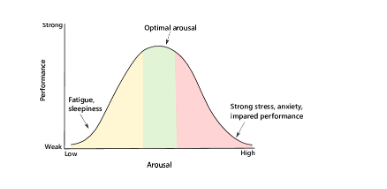Factors affecting eyewitness testimony :Anxiety -A-Level Psychology
The effects of anxiety:
Anxiety has strong emotional(worried,tension) and physical effects (increased bp).It can affect the accuracy and detail of an EWT.
Anxiety has a negative effect on recall:
Anxiety creates physiological arousal in the body which prevents us from paying attention to important cues which makes recall worse.
Johnson and Scott:
-Led participants to believe they were taking part in a lab study
-Low anxiety condition-whilst seated in the waiting room participants overheard an argument next door .Then a man walked in holding a pen covered in grease on his hands.
-High anxiety condition-the argument was accompanied by the sound of glass breaking.Then a man walked in holding a plastic knife with blood on it.
Findings:
Later the participants had to pick the man out of 50 photos.49% of those who in the low anxiety condition could identify him.33% of those in the high anxiety condition could identify the man.
The tunnel theory of memory argues that the witness’s attention is focused on the weapon which is the source of anxiety.
Anxiety has a positive effect on recall:
-the stress of witnessing a crime creates anxiety.The flight or fight response is triggered which increases alertness and thus improves memory due to the fact we become more aware of cues in the situation.
Yuille and Cutshall:
-conducted a real life shooting at a gun shop
-the shop owner shot the thief dead
-21 witnesses.13 agreed to take part in the stud
-Interviews held after 4-5 months were compared with the original interview
-accuracy was determined through the details provided
-they were asked to rate their stress levels during the incident (7 point scale)
-they were asked if they experienced any emotional problems since the event
-those who reported experiencing the highest levels of stress were most accurate
Explaining the contradictory findings:
Yerkes-Dodson law

Evaluation:
Ethical issues-some participants may have experienced psychological harm.
Weapon focus may not be relevant-Pickel conducted an experiment using scissors to raw chicken in a hair salon.Eyewitness accuracy was poorer in the high unusualness conditions.This can suggest that weapon focus is down to unusualness rather than anxiety so isn’t relevant.
Eyewitness testimony is an account of an event or crime provided by someone who has witnessed it.
Eyewitness testimony can be unreliable because memory is fallible and can be influenced by a range of factors, such as anxiety, stress, and leading questions.
Anxiety can affect eyewitness testimony by impairing memory recall and causing witnesses to focus on irrelevant details. High levels of anxiety can also lead to overconfidence in the accuracy of memory recall.
The Yerkes-Dodson law states that performance on a task improves with increased arousal or stress up to a point, after which it starts to decline. This means that moderate levels of anxiety may actually enhance memory recall, but high levels can have a detrimental effect.
Weapon focus is a phenomenon where witnesses focus their attention on a weapon during a crime, often to the detriment of their memory recall of other details.
Yes, leading questions can have a significant impact on eyewitness testimony by influencing how witnesses remember events or providing them with false information.
Some ways to improve the reliability of eyewitness testimony include using open-ended questions rather than leading questions, avoiding suggestive language, and using video or audio recordings of the witness’s initial statement.
The reliance on eyewitness testimony in criminal trials can have significant ethical implications, particularly if the testimony is unreliable or biased. This can lead to wrongful convictions or acquittals, and can have a negative impact on the lives of innocent individuals.






Still got a question? Leave a comment
Leave a comment